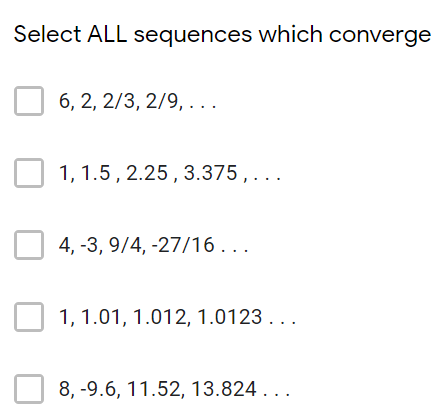Arithmetic, geometric or neither. If possible, give the common difference/ratio.
-8, -3, 2, 7, 12, ...
arithmetic with common difference of +5.
Fundamental counting principle, permutations, or combinations?
Jenny is at Dunkin Donuts to get a dozen donuts for a meeting at work. She wants to get an assortment of donuts. The shop only has 10 different types of donuts today so she'll have to get some of the same type. How many ways can she get an assortment of 12 donuts?
Fundamental counting principle
Depending on how she wants to "assort" her donuts you could do: 10^12 or 10!*10*9 or 10!*10*10 ...
1
Find the 8th partial sum of the series 16 + 12 + 9 + . . .
Sigma_"n=1"^8 16(3/4)^(n-1)
57.592...
Write the first 5 terms of the sequence given by the explicit formula:
a_n = n/((n+2)!)
1/6, 1/12, 1/40, 1/180, 1/1008
or
1/6, 2/24, 3/120, 4/720, 5/5040
You're choosing a number from 1-20. Let event A be "choosing a multiple of 5". Give the event which is complementary to event A
not choosing a multiple of 5
0.27*0.27 = 0.0729 or 7.29%
write a sigma notation for the series: 8 + 15 + 24 + 35 + 48
Sigma_"n=3"^7 n^2-1
Sigma_"n=1"^5 (n+2)^2-1
My starting salary in the United States was $37,475. Each year, for the first 5 years, I would get a 2% increase. How much money had I earned after working 4 years in the United States?
sum_(n=1)^4(37475(1.02)^(n-1)) = $154457.26
You're choosing a number from 1-20. Let event A be "choosing a multiple of 5". Let event B be "choosing an odd number". Are A and B mutually exclusive? Why or why not?
No because they both contain the numbers 5 and 15. (the intersection is not the empty set)
You're choosing a number from 1-20. Let event A be "choosing a multiple of 5". Let event B be "choosing an odd number". Find P(A and B)
A and B = {5, 15} so P(A and B) = 2/20 = 1/10
How many different arrangements can you make from the letters in the word "DISTINGUISHABLE"?
15!/(3!2!) = 1.08972864x1011
Find the infinite sum. If it diverges, explain why.
sum_(n=1)^oo 8(5/3)^(n-1)
The sum diverges because |r| > 1. (r = 5/3 = 1.67)
There are 24 elementary teachers (9 men and 15 women). A group of 3 teachers interview incoming students. How many ways could you make the group if there should be 1 man and 2 women?
9C1*15C2 = 945 ways
There are 24 elementary teachers (9 men and 15 women). A group of 3 teachers interview incoming students. What is the probability that the group will be all men?
9C3/24C3 = 21/506 = 0.0415
During lunch last year at school, we had to social distance in line. If Dr. T decides that the grades will eat in order (12th grade first, 11th grade next, 10th grade after that), how many ways can people stand in line if there are 36 students in 12th grade, 42 students in 11 grade, and 33 students in 10th grade?
36P36 * 42P42 * 33P33
Find the infinite sum. If it diverges, explain why.
sum_(n=1)^oo 8(3/5)^(n-1)
The sum converges to 8/(1-3/5) = 20
Mr. McCormack will compete in a triathlon next year. If 200 people compete, how many ways could the top 3 (1st, 2nd, 3rd) finishers come in?
200P3 = 7880400
You're choosing a number from 1-20. Let event A be "choosing a multiple of 5". Let event B be "choosing an odd number". Find P(A or B)
P(A) + P(B) - P(A and B) = 4/20 + 10/20 - 2/20 = 12/20 = 6/10 = 3/5 = 0.6

first and third sequences only (1st sequence r = 1/3. third sequence r = -3/4)